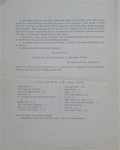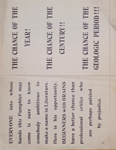100th
MP

|
THE
100th
MONKEY
PRESS |
|
|
|
Limited Editions by Aleister Crowley & Victor B. Neuburg |
|
Bibliographies |
|
Download Texts
»
Aleister
Crowley
WANTED !!NEW!!
|
|
A CAREER FOR AN ESSAY |
|
Image Thumbnails |
||||||
|
Title: |
A Career for an Essay |
|
||||
|
Variations: |
|
|||||
|
Publisher: |
Society for the Propagation of Religious Truth (S.P.R.T.).1 |
|||||
|
Printer: |
Privately printed.1 |
|||||
|
Published At: |
Boleskine, Foyers, Inverness.1 |
|||||
|
Date: |
1905.1 |
|||||
|
Edition: |
First Edition. |
|||||
|
Pages: |
4. |
|||||
|
Price: |
|
|||||
|
Remarks: |
Has a detachable order form to order The Works of Aleister Crowley, Volume 1.2 This small pamphlet announced the competition for an essay on the works of Aleister Crowley and offered a prize of £100 for the best essay either hostile or appreciative. The Collected Works were offered to bona fide competitors for the price of 5s. for each volume. The winner of this competition was J.F.C. Fuller and his essay was later published in 1907 as The Star in the West. "Career for an Essay" also appears in the rear of Crowley's In Residence. |
|||||
|
Pagination: |
|
|||||
|
Contents: |
|
|||||
|
Author’s Working Versions: |
|
|||||
|
Other Known Editions: |
|
|||||
|
Bibliographic Sources: |
|
|
||||
|
Comments by Aleister Crowley: |
||||||
|
Reviews: |
This
method of propagating minor poetry is not more remarkable than
the publication of such poetry by the Society. ______________________________
The following advertisement, which has been sent to me, is, perhaps, of the cosmic variety of humour; at all events, it is ‘new’ enough, and the reference to ‘The Chance of the Geologic Period’ bears a moderately cosmic complexion:
‘THE CHANCE OF THE YEAR! ‘THE CHANCE OF THE CENTURY!! ‘THE CHANCE OF THE GEOLOGIC PERIOD!!!
‘Everyone into whose hands this pamphlet may come is sure to know somebody ambitious to make a name in Literature. Here is his opportunity. BEGINNERS with BRAINS have a better chance than professional critics who are perhaps palsied by prejudice.’
The chance is this. The S.P.R.T. or Society for Propagating Religious Truth, offers 100£ for the best essay on the works of Aleister Crowley. I never heard of Mr. Crowley; but he is the author of Jezebel (21s.), Carmen Saeculare (hitherto attributed to Flaccus), Ahab, Alice, The Soul of Osiris, and many, many other works. Competitors must purchase these, which are being reprinted in a cheap form. ‘Should two essays appear of supreme and equal merit’—say with ‘a perpetual coruscation of the cosmic spirit,’ as Mr. Douglas writes—then the Society will raise the pool to 150£, and the winners will divide that princely sum. But first they must read the works of Mr. Aleister Crowley, so I do not mean to enter: I do not feel absolute enough. If any reader of these lines wants to enter, let him communicate with The Secretary, S.P.R.T., Boleskine, Foyers, Inverness. Being, in a way, ‘a professional,’ I am ‘perhaps palsied by prejudice.’ How does it work out as a commercial speculation? Say that I have written seventy works, and offer a prize of 100£ for the best essay on them. Let us put the price at five shillings a volume. Competitors must each pay me three hundred and fifty shillings. That makes about 17£, and some odd shillings; I am no mathematician, but it is thereabouts. Now, say that only five hundred persons are ‘ambitious to make a name in literature.’ Five hundred times 17£ is 8500£, out of which I shall refund, as a prize, say, 150£. I net 8350£; not bad. Mr. Crowley has only written nineteen books, not seventy, but there may be thousands of competitors for his prize; if so, whether Religious Truth is advanced or not, the pecuniary results will be gratifying. I expect to see this plan freely adopted by modern authors with a genius for advertisement. That sort of genius, at least, is common, and is rather ill-advised. Men of soaring powers let themselves be photographed with their favourite dogs, cats, mongooses, books, pictures, statues, old hats, to illustrate articles about the shapes of their noses, the colour of their flashing peepers, their too obvious failure to use Tatcho, their grandmothers, their conversation, their royalties, their translators, their lady admirers, their choice of a sepulchre, their taste in teas or in cigarettes, their holiday adventures, their old slippers, and all the rest of it. I do not even believe that it is good business as advertisement. Thousands of people would swallow this information—they would read if it were about Jones or x.—who will never open the pages of the author that is tattled about. Happily a few writers, and these the best, have not made friends with this Mammon of journalistic unrighteousness. —Longman’s Magazine, March 1905. |
|||||




